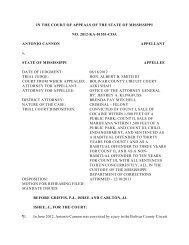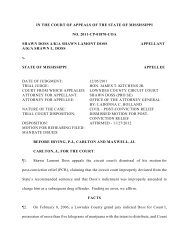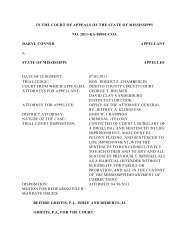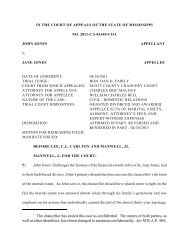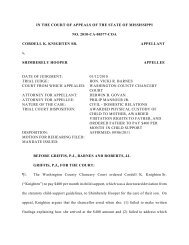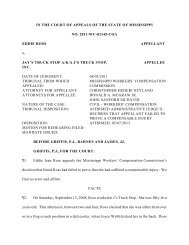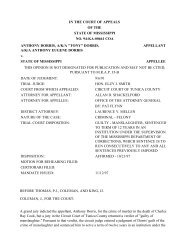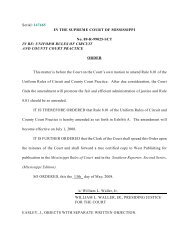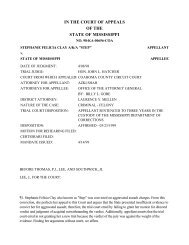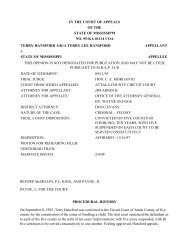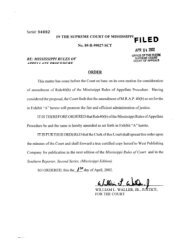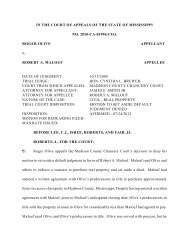Jones v. Mallett, Nov-14-2013 - Courthouse News Service
Jones v. Mallett, Nov-14-2013 - Courthouse News Service
Jones v. Mallett, Nov-14-2013 - Courthouse News Service
Create successful ePaper yourself
Turn your PDF publications into a flip-book with our unique Google optimized e-Paper software.
TERENCE T. JONES<br />
v.<br />
IN THE SUPREME COURT OF MISSISSIPPI<br />
NO. 2012-CA-00385-SCT<br />
ANNETTE BROWN MALLETT, MISSISSIPPI<br />
DEPARTMENT OF PUBLIC HEALTH-STATE<br />
REGISTRAR OF VITAL STATISTICS AND<br />
MISSISSIPPI DEPARTMENT OF HUMAN<br />
SERVICES<br />
DATE OF JUDGMENT: 02/16/2012<br />
TRIAL JUDGE:<br />
HON. EDWARD C. FENWICK<br />
COURT FROM WHICH APPEALED: ATTALA COUNTY CHANCERY COURT<br />
ATTORNEY FOR APPELLANT: JOHN FITZGERALD HUGHES<br />
ATTORNEYS FOR APPELLEES: JOSHUA LEE EURE<br />
TRACY A. BOWEN<br />
DAVID LEE LOVE<br />
NATURE OF THE CASE:<br />
CIVIL - DOMESTIC RELATIONS<br />
DISPOSITION: AFFIRMED - 11/<strong>14</strong>/<strong>2013</strong><br />
MOTION FOR REHEARING FILED:<br />
MANDATE ISSUED:<br />
BEFORE RANDOLPH, P.J., LAMAR AND KITCHENS, JJ.<br />
RANDOLPH, PRESIDING JUSTICE, FOR THE COURT:<br />
1. Terence <strong>Jones</strong> (<strong>Jones</strong>) appeals the Attala County Chancery Court’s denial of his 2011<br />
petition to disestablish paternity, which relied on Section 93-9-10(3)(c) of the Mississippi<br />
Code. Because <strong>Jones</strong> signed a stipulated agreement of paternity that was approved by order<br />
of the Attala County Chancery Court in 2000, the chancery court properly denied <strong>Jones</strong>’s
petition as presented. Accordingly, we affirm the chancery court’s judgment denying <strong>Jones</strong>’s<br />
petition for disestablishment of paternity.<br />
FACTS<br />
2. In 2000, <strong>Jones</strong> was involved in a nonmarital, romantic relationship with Annette<br />
Brown <strong>Mallett</strong>. <strong>Mallett</strong> gave birth to a child on August 22, 2000. It is unclear when exactly<br />
<strong>Jones</strong> first learned that he may not have been the child’s father. <strong>Mallett</strong> claims she informed<br />
<strong>Jones</strong> upon announcing the pregnancy. <strong>Jones</strong> claims that he did not learn that he might not<br />
be the father until shortly after signing the paternity agreement as well as the birth certificate.<br />
Specifically, <strong>Jones</strong> stated that he learned of the possibility a couple of months after the<br />
child’s birth. 1<br />
3. Regardless, <strong>Jones</strong> was named the child’s biological father on the birth certificate, and<br />
he signed the birth certificate. Subsequently, on October 16, 2000, <strong>Jones</strong> entered into a<br />
“Stipulated Agreement of Support and Admission of Paternity” admitting paternity and<br />
agreeing to pay $115 each month in child support. The stipulated agreement of paternity was<br />
approved by order of the Attala County Chancery Court in cause number 2000-286. No<br />
appeal of that order and cause number has been taken.<br />
4. In December 2010 (ten years after <strong>Jones</strong> first learned that he might not be the child’s<br />
father), <strong>Jones</strong> had a DNA test performed, which excluded <strong>Jones</strong> as the child’s biological<br />
father. On March 2, 2011, <strong>Jones</strong> filed the present separate action to disestablish paternity, as<br />
1<br />
<strong>Jones</strong> later clarified that “a couple of months” meant somewhere around two, three,<br />
or four months after the child was born.<br />
2
opposed to seeking relief from the final judgment entered in cause number 2000-286 via a<br />
2<br />
Rule 60(b)(5) or (6) motion. <strong>Jones</strong> filed an amended petition on July 21, 2011. On December<br />
1, 2011, the chancery court entered an agreed order for a DNA test to be performed through<br />
the Mississippi Department of Human <strong>Service</strong>s (DHS), which again excluded <strong>Jones</strong> as the<br />
biological father. On December 5, 2011, <strong>Jones</strong> filed a second amended petition. The chancery<br />
court held a hearing on January 19, 2012, and granted <strong>Mallett</strong>’s oral motion to dismiss<br />
<strong>Jones</strong>’s petition to disestablish paternity, citing Section 93-9-10 of the Mississippi Code.<br />
LAW AND ANALYSIS<br />
5. <strong>Jones</strong> does not dispute the underlying facts. The sole issue he presents is the<br />
interpretation and application of three subsections of Mississippi Code Section 93-9-10(3).<br />
Accordingly, the applicable standard of review is de novo. Tellus Operating Group, LLC v.<br />
Texas Petroleum Inv. Co., 105 So. 3d 274, 278 (Miss. 2012) (“Questions of law, such as<br />
statutory interpretation, are subject to a de novo standard of review.”).<br />
6. Mississippi Code Section 93-9-10(3) provides, in relevant part, as follows:<br />
a court shall not set aside the paternity determination or child support order if<br />
the legal father engaged in any of the following conduct:<br />
. . .<br />
2<br />
Rule 60(b)(5) of the Mississippi Rules of Civil Procedure offers relief to a party<br />
when “it is no longer equitable that the judgment should have prospective application.”<br />
M.R.C.P. 60; See M.A.S. v. Miss. Dep’t of Human Servs., 842 So. 2d 527, 531 (Miss.<br />
2003).<br />
3
(b) Consented to be named as the biological father on the child’s birth<br />
certificate and signed the birth certificate application or executed a simple<br />
acknowledgment of paternity and failed to withdraw consent or<br />
acknowledgment within the time provided for by law in Sections 93-9-9 and<br />
93-9-28, unless he can prove fraud, duress or material mistake of fact;<br />
(c) Signed a stipulated agreement of paternity that has been approved by order<br />
of the court;<br />
(d) Signed a stipulated agreement of support that has been approved by order<br />
of the court after having knowledge that he is not the biological father of the<br />
child . . . .<br />
Miss. Code Ann. § 93-9-10(3) (Rev. <strong>2013</strong>). <strong>Jones</strong> does not dispute that he signed a stipulated<br />
agreement of paternity that was approved by the chancery court, which subsection (c) clearly<br />
identifies as conduct that precluded the chancery court from setting aside the paternity<br />
determination.<br />
7. Even so, <strong>Jones</strong> argues that the chancery court erred by failing to disestablish paternity<br />
under subsection (b) or (d). Under subsection (b), <strong>Jones</strong> argues that he “operated under a<br />
material mistake of fact promulgated by assertions by <strong>Mallett</strong> that he was the father of the<br />
minor child” and “he had no knowledge that he was entitled to a DNA test prior to executing<br />
the paternity acknowledgement [sic].” The facts as presented do not establish sufficient<br />
circumstances for the application of subsection (b).<br />
8. Under subsection (d), <strong>Jones</strong> argues that “[w]hen subparts (c) and (d) are read together,<br />
3<br />
it is evident that <strong>Jones</strong> meets the test presented by [Section] 93-9-10 in total.” However,<br />
3<br />
<strong>Jones</strong> concedes that “the lower court is correct that <strong>Jones</strong> did stipulate to the paternity<br />
agreement,” so that “if subpart (c) is considered as an island unto itself, the lower court<br />
would be correct.”<br />
4
subsection (d) is not a mere reiteration of subsection (c), other than the language regarding<br />
the legal father’s knowledge that he is not the biological father. Rather, subsection (c)<br />
prevents a chancery court from setting aside a paternity determination when a legal father has<br />
signed a stipulated agreement of paternity, while subsection (d) prevents a chancery court<br />
from setting aside a paternity determination when a legal father has signed a stipulated<br />
agreement of support. Miss. Code Ann. § 93-9-10(3)(c)-(d) (Rev. <strong>2013</strong>).<br />
9. We agree with Mallet that it is clear the Legislature intended to draw a distinction<br />
between the legal father who stipulates to paternity in subsection (3)(c) versus one who<br />
stipulates only to pay child support in subsection (3)(d). A legal father may stipulate to the<br />
court to pay child support without a paternity establishment because he is already the legal<br />
father by operation of law. Section 93-9-10(3)(d) allows such a legal father an opportunity<br />
to disestablish paternity upon negative genetic testing as long as he did not stipulate to<br />
support after having knowledge he was not the biological father. In other words, a<br />
nonjudicially determined legal father is given greater freedom to disestablish paternity under<br />
Section 93-9-10(3) than a father who is adjudicated a parent through a court order.<br />
10. Thus, based on the language of the statute, subsections (c) and (d) are distinct<br />
provisions that apply in different factual scenarios. <strong>Jones</strong> does not dispute that he signed a<br />
stipulated agreement of paternity that was approved by the chancery court – the exact factual<br />
scenario addressed by subsection (c). Accordingly, the chancery court did not err by denying<br />
<strong>Jones</strong>’s motion to disestablish paternity.<br />
CONCLUSION<br />
5
11. We affirm the judgment of the Attala County Chancery Court.<br />
12. AFFIRMED.<br />
WALLER, C.J., DICKINSON, P.J., LAMAR, KITCHENS, CHANDLER,<br />
PIERCE, KING AND COLEMAN, JJ., CONCUR.<br />
6



